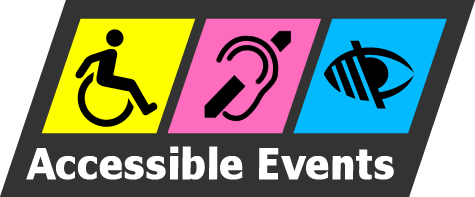Key Considerations for Planning an Event
General Issues:
- What can we do to create an accessible meeting/event?
- Do we understand the importance of budget implications in the planning? – the initial budget should allow for potential costs to cover such services as Signers and Oral interpretation, Braille translation …
- Do we understand the disabled person’s needs – what are the barriers to full participation?
- Are we adopting an inclusive approach that embraces the needs of all people? Could we understand our audience’s access needs better? What can we do to ensure staff can be easily identified? Consider staff wearing name tags, and verbally introducing themselves to Blind and Visually Impaired People; and clearly indicating where they will be sitting, or can be alerted, or contacted.
- Do we understand that participants providing information (for example display/information boards, power point presentations and leaflets) need to ensure that their material is accessible? – this will require early consideration.
- Note: If finance is an issue, have you thought about sharing resources i.e. from other community groups, or statutory organisations?
Legal Issues:
- Are we fulfilling our Equality Duty under the Equality Act 2010?
- Where it is not possible to provide full accessibility are we ensuring reasonable adjustments are offered? (Contact High Peak Access Group if you require advice, or information: highpeakaccess.org.uk Tel: 01663 735 350
- What can we do if we cannot meet all of the access criteria? Seek an alternative, for example, perhaps a home visit to establish a person’s needs.
Recognising Specific Needs:
- Do we understand the disabled person’s needs – what are the barriers to full participation?
- Are we connecting with ‘hard to reach groups’? Can they be reached via third party agencies, for instance, High Peak CVS? (This would be seen as ‘reasonable’).
- Who will be reading this information about the event, for example, Blind and Visually Impaired People need the information?
- A number of Blind People will be accompanied by a Guide Dog. Have you thought about the provision for a Guide Dog in terms of seating?
- Who will be meeting Blind People and Visually Impaired People at the principal entrance? (If time permits, it would be beneficial to offer a tour of the venue to Blind People and Visually Impaired People before the event starts.) If not possible, Blind People must have a designated person who can guide them to the toilet facilities and exits.
- If the meeting entails breaking into small workshops to discuss certain topics, then people with Learning Difficulties and Deaf or Hard of Hearing people will require smaller rooms, rather than having several small groups in a large room. Deaf and Hard of Hearing people require quietness otherwise background noise will interrupt participation.
- If Restrooms are required ensure that they are located on the same floor as the meeting.
- Do we understand the needs of Deaf People and Hard of Hearing People to have the correct information before the meeting in regard to what aids/facilities are available for their needs?
- Do we understand the needs of people with Learning Disability, for example a red and green card system to help people participate?

